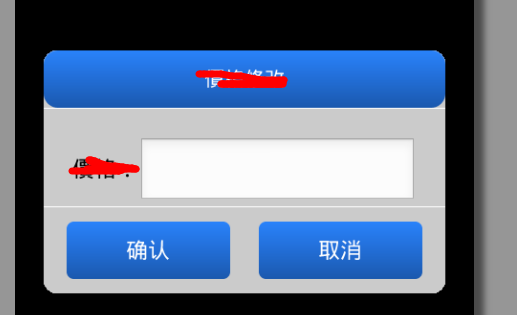这篇文章将为大家详细讲解有关Android编程怎么实现在自定义对话框中获取EditText数据,小编觉得挺实用的,因此分享给大家做个参考,希望大家阅读完这篇文章后可以有所收获。
在项目中忽然遇到这样的问题,需要自定义对话框,对话框需要有一个输入框,以便修改所选中的价格,然后点击确定之后,修改所显示的价格。遇到的最大的问题就是如何能够获取到自定义对话框当中edittext输入的数值,百度了很久,看到的答案都是如下:
//得到自定义对话框 final View DialogView = a .inflate ( R.layout.loand, null);
这是关键的代码
//创建对话框
AlertDialog dlg = new AlertDialog.Builder(loand.this)
.setTitle("登录框")
.setView(DialogView)//设置自定义对话框的样式
.setPositiveButton("登陆", //设置"确定"按钮
new DialogInterface.OnClickListener() //设置事件监听
{
public void onClick(DialogInterface dialog, int whichButton)
{
editText1 =(EditText) DialogView.findViewById(R.id.editText1);
editText2 =(EditText) DialogView.findViewById(R.id.editText2);
String id = editText1.getText().toString();
String password = editText2.getText().toString();
//输入完成后,点击“确定”开始登陆
c_log judge = new c_log();
boolean b_judge = judge.aa(id,password);
if(b_judge){
bar();
}else{
//加东西
DisplayToast("NO");
}
}
})上述方法对于使用系统自带的alertdialog来说,的确是没有问题,能够取到你输入的edittext的值,但对于自定义的alertdialog来说,就会始终拿到的是空的,我的解决方案是在自定义alertdialog里面取到edittext并且实例化,避免在activity里面进行初始化,步骤如下:
1.主要的activity主类代码:
package client.verbank.mtp.allone.frame.systemsettings;
import android.app.AlertDialog;
import android.content.DialogInterface;
import android.content.Intent;
import android.os.Bundle;
import android.os.Handler;
import android.view.LayoutInflater;
import android.view.View;
import android.view.View.OnClickListener;
import android.view.ViewGroup;
import android.widget.CompoundButton;
import android.widget.CompoundButton.OnCheckedChangeListener;
import android.widget.TextView;
import android.widget.ToggleButton;
import client.verbank.mtp.allone.R;
import client.verbank.mtp.allone.component.CustomDialogPriceModify;
import client.verbank.mtp.allone.consts.IBundleCommData;
import client.verbank.mtp.allone.consts.ISystemCommData;
import client.verbank.mtp.allone.frame.ControlFragment;
import client.verbank.mtp.allone.frame.MainActivity;
import client.verbank.mtp.allone.frame.systemsettings.nextpage.ChangePasswordActivity;
import client.verbank.mtp.allone.frame.systemsettings.nextpage.ChangePhonePinActivity;
import client.verbank.mtp.allone.frame.systemsettings.nextpage.ChooseRssActivity;
import client.verbank.mtp.allone.frame.systemsettings.nextpage.SelectInstrumentActivity;
import client.verbank.mtp.allone.util.SharepreferencesUtilSystemSettings;
/**
* 系统设置界面
*
* @Project: FEIB_AndroidStation
* @Title: SystemSettingsFragment.java
* @Package client.verbank.mtp.allone.frame.systemsettings
* @Description: TODO
* @author qiulinhe qiu.linhe@allone.cn
* @date 2015年9月29日 上午11:48:53
* @Copyright: 2015 www.allone.cn Inc. All rights reserved.
* @version V3.0.0
*/
public class SystemSettingsFragment extends ControlFragment implements
ISystemCommData {
// 四组需要打钩的textview初始化
private TextView currencypairs;
private TextView openpositionprice;
private TextView floatingprofit;
private TextView dealtime;
private TextView ordercurrencypairs;
private TextView pricehighend;
private TextView priceendhigh;
private TextView summarycurrencypairs;
private TextView summaryfloatingprofit;
private TextView riseandfall;
private TextView applies;
// 三个自定义输入金额
private TextView inputamount2;
private TextView inputamount5;
private TextView inputamount10;
// 跳转到下一个页面的4个textview,货币对选择、密码修改、凭证密码修改、RSS源选择
private TextView Currencyofchoice;
private TextView changepassword;
private TextView changecertificatepassword;
private TextView rsssource;
ToggleButton mosthightoggle;
ToggleButton mostlowtoggle;
ToggleButton riseandfallmenutoggle;
ToggleButton pricetimetoggle;
View layout;
// EditText price;
AlertDialog dlg;
int flagprice = 0;
private Handler handler = new Handler();
public SystemSettingsFragment(MainActivity activity) {
super(activity);
}
@Override
public View onCreateView(LayoutInflater inflater, ViewGroup container,
Bundle savedInstanceState) {
View vi = inflater.inflate(R.layout.system_settings, container, false);
// 价格修改弹出对话框
layout = inflater.inflate(
R.layout.activity_systemsettings_pricecustom_dialog,
(ViewGroup) vi.findViewById(R.id.dialog));
//。。。。。。。。。。省略了部分代码,因为是公司项目的。。。。。。。。。。。。。。
// 三个自定义金额的监听事件
private void selfThreeMoneyLister(View vi) {
inputamount2.setOnClickListener(new OnClickListener() {
@Override
public void onClick(View v) {
modifyPriceDialog();
flagprice = 1;
}
});
inputamount5.setOnClickListener(new OnClickListener() {
@Override
public void onClick(View v) {
modifyPriceDialog();
flagprice = 2;
}
});
inputamount10.setOnClickListener(new OnClickListener() {
@Override
public void onClick(View v) {
modifyPriceDialog();
flagprice = 3;
}
});
}
// 点击价格,弹出编辑框,对价格进行修改
private void modifyPriceDialog() {
LayoutInflater factory = LayoutInflater.from(getActivity());
final View DialogView = factory.inflate(
R.layout.activity_systemsettings_pricecustom_dialog, null);
final CustomDialogPriceModify.Builder builder = new CustomDialogPriceModify.Builder(
getActivity());
builder.setTitle("價格修改");
builder.setPositiveButton(R.string.confirm,
new DialogInterface.OnClickListener() {
@Override
public void onClick(DialogInterface dialog, int which) {
// 获取edittext的值
String priceStr = builder.getPrice();//关键代码,getPrice放在自定义的alertdialog类里面,进行初始化
if (flagprice == 1) {
inputamount2.setText(priceStr);
SharepreferencesUtilSystemSettings.putValue(
getActivity(), System_key_SelfAmout2,
priceStr);
} else if (flagprice == 2) {
inputamount5.setText(priceStr);
SharepreferencesUtilSystemSettings.putValue(
getActivity(), System_key_SelfAmout5,
priceStr);
} else {
inputamount10.setText(priceStr);
SharepreferencesUtilSystemSettings.putValue(
getActivity(), System_key_SelfAmout10,
priceStr);
}
// price.setText("");
/**
* 取得view的父组件,然后移除view
*/
dialog.dismiss();
}
});
builder.setNegativeButton(R.string.cancel,
new android.content.DialogInterface.OnClickListener() {
@Override
public void onClick(DialogInterface dialog, int which) {
// TODO Auto-generated method stub
// ((ViewGroup) layout.getParent()).removeView(layout);
dialog.dismiss();
}
});
builder.create().show();
}
}2.自定义alertdialog类,CustomDialogPriceModify.java,如下:
package client.verbank.mtp.allone.component;
import android.app.Dialog;
import android.content.Context;
import android.content.DialogInterface;
import android.view.LayoutInflater;
import android.view.View;
import android.view.ViewGroup.LayoutParams;
import android.widget.Button;
import android.widget.EditText;
import android.widget.TextView;
import client.verbank.mtp.allone.R;
/**
* 系统设定中修改价格的弹出对话窗口
*
* @author wangyubo
*
*/
public class CustomDialogPriceModify extends Dialog {
public CustomDialogPriceModify(Context context) {
super(context);
}
public CustomDialogPriceModify(Context context, int theme) {
super(context, theme);
}
public static class Builder {
private Context context;
private String title;
private float textSize;
private String message;
private String positiveButtonText;
private String negativeButtonText;
private View contentView;
private EditText priceText;
private DialogInterface.OnClickListener positiveButtonClickListener;
private DialogInterface.OnClickListener negativeButtonClickListener;
public Builder(Context context) {
this.context = context;
}
public Builder setMessage(String message) {
this.message = message;
return this;
}
public Builder setMessage(String message, float textSize) {
this.message = message;
this.textSize = textSize;
return this;
}
/**
* Set the Dialog message from resource
*
* @param title
* @return
*/
public Builder setMessage(int message) {
this.message = (String) context.getText(message);
return this;
}
/**
* Set the Dialog title from resource
*
* @param title
* @return
*/
public Builder setTitle(int title) {
this.title = (String) context.getText(title);
return this;
}
/**
* Set the Dialog title from String
*
* @param title
* @return
*/
public Builder setTitle(String title) {
this.title = title;
return this;
}
public Builder setContentView(View v) {
this.contentView = v;
return this;
}
/**
* Set the positive button resource and it's listener
*
* @param positiveButtonText
* @return
*/
public Builder setPositiveButton(int positiveButtonText,
DialogInterface.OnClickListener listener) {
this.positiveButtonText = (String) context
.getText(positiveButtonText);
this.positiveButtonClickListener = listener;
return this;
}
//关键代码
public String getPrice() {
return priceText.getText().toString();
}
public Builder setPositiveButton(String positiveButtonText,
DialogInterface.OnClickListener listener) {
this.positiveButtonText = positiveButtonText;
this.positiveButtonClickListener = listener;
return this;
}
public Builder setNegativeButton(int negativeButtonText,
DialogInterface.OnClickListener listener) {
this.negativeButtonText = (String) context
.getText(negativeButtonText);
this.negativeButtonClickListener = listener;
return this;
}
public Builder setNegativeButton(String negativeButtonText,
DialogInterface.OnClickListener listener) {
this.negativeButtonText = negativeButtonText;
this.negativeButtonClickListener = listener;
return this;
}
public CustomDialogPriceModify create() {
LayoutInflater inflater = (LayoutInflater) context
.getSystemService(Context.LAYOUT_INFLATER_SERVICE);
// instantiate the dialog with the custom Theme
final CustomDialogPriceModify dialog = new CustomDialogPriceModify(
context, R.style.Dialog);
dialog.setCanceledOnTouchOutside(false);
dialog.setCancelable(false);
View layout = inflater.inflate(
R.layout.activity_systemsettings_pricecustom_dialog, null);
dialog.addContentView(layout, new LayoutParams(
LayoutParams.FILL_PARENT, LayoutParams.WRAP_CONTENT));
// set the dialog title
((TextView) layout.findViewById(R.id.title)).setText(title);
priceText = (EditText) layout.findViewById(R.id.price);
//对edittext进行初始化,关键代码
if (positiveButtonText != null) {
((Button) layout.findViewById(R.id.positiveButton))
.setText(positiveButtonText);
if (positiveButtonClickListener != null) {
((Button) layout.findViewById(R.id.positiveButton))
.setOnClickListener(new View.OnClickListener() {
@Override
public void onClick(View v) {
positiveButtonClickListener.onClick(dialog,
DialogInterface.BUTTON_POSITIVE);
}
});
}
} else {
// if no confirm button just set the visibility to GONE
layout.findViewById(R.id.positiveButton).setVisibility(
View.GONE);
}
// set the cancel button
if (negativeButtonText != null) {
((Button) layout.findViewById(R.id.negativeButton))
.setText(negativeButtonText);
if (negativeButtonClickListener != null) {
((Button) layout.findViewById(R.id.negativeButton))
.setOnClickListener(new View.OnClickListener() {
@Override
public void onClick(View v) {
negativeButtonClickListener.onClick(dialog,
DialogInterface.BUTTON_NEGATIVE);
}
});
}
} else {
// if no confirm button just set the visibility to GONE
layout.findViewById(R.id.negativeButton).setVisibility(
View.GONE);
}
// set the content message
if (message != null) {
TextView msgView = (TextView) layout.findViewById(R.id.message);
msgView.setText(message);
if (textSize != 0) {
msgView.setTextSize(textSize);
}
} else if (contentView != null) {
}
dialog.setContentView(layout);
return dialog;
}
}
}3.剩下的就是布局代码,包括一些圆角的,如果需要的可以参考我之前的博文,就不贴代码了。完成效果如下:

Android是一种基于Linux内核的自由及开放源代码的操作系统,主要使用于移动设备,如智能手机和平板电脑,由美国Google公司和开放手机联盟领导及开发。
关于“Android编程怎么实现在自定义对话框中获取EditText数据”这篇文章就分享到这里了,希望以上内容可以对大家有一定的帮助,使各位可以学到更多知识,如果觉得文章不错,请把它分享出去让更多的人看到。
免责声明:本站发布的内容(图片、视频和文字)以原创、转载和分享为主,文章观点不代表本网站立场,如果涉及侵权请联系站长邮箱:is@yisu.com进行举报,并提供相关证据,一经查实,将立刻删除涉嫌侵权内容。